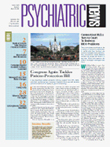An intensive two-year fellowship will “educate the educators” in an effort to improve treatment for people with substance use disorders.
The program, known as the Interdisciplinary Faculty Program to Improve Substance Abuse Education, will use 10 nationally recognized experts in substance abuse education to teach faculty in various health care professions about substance abuse and its treatment.
As part of the program, fellows will be expected to expand the curriculum on substance use disorders at each of the faculty’s home institutions.
The $1 million program is funded by two sources—the Substance Abuse and Mental Health Services Administration’s Center for Substance Abuse Treatment and the Health Resources Services Administration. The Association for Medical Education and Research in Substance Abuse will implement the faculty education program.
In January faculty from 15 health care professions, including medicine, nursing, and pharmacy, applied for the fellowship positions in groups of three—each from a different discipline. There are 10 groups of three fellows, and teams are modeled after interdisciplinary treatment teams in clinical settings. These so-called Interdisciplinary Faculty Learning Groups may include faculty from the same institution or from the same geographic location to facilitate group learning. One mentor—an expert in addictions education—has been assigned to train each group of fellows.
“There is a tremendous need to educate faculty about substance abuse,” said Richard Brown, M.D., M.P.H., project director and an associate professor of family medicine at the University of Wisconsin Medical School. “Research documents that screening, assessment, brief intervention, and treatment are effective for people with risky or problematic substance use.”
He pointed out that these skills are not being taught to professional educators and, as a result, most patients do not receive these services in a general medical setting. “Now we need to train the trainers so a new generation of clinicians can deliver these services to patients,” he added.
Richard S. Schottenfeld, M.D., chair of APA’s Committee on Training and Education in Addiction Psychiatry, agreed. “The program addresses the deficiencies that exist in medical schools, general residency, and even in the most specialized and advanced training, where people often learn very little about identification and treatment of addictive disorders,” said Schottenfeld, who blames stigmatization of addictive disorders as one reason for the lack of proper substance abuse training in health care curricula. “Addiction is not viewed so much as a medical illness, as recent evidence shows, but as a moral failing.”
Schottenfeld, a professor of psychiatry at Yale and the director of substance abuse treatment at the Connecticut Health Center, also values the collaborative side of the project. “The faculty program provides role models for faculty with whom they wouldn’t normally come into contact with at their own institutions.”
These role models, or program mentors, will educate their fellows beginning in May at national and regional fellowship meetings, as well as during monthly telephone calls, e-mail exchanges, and site visits. The mentors, who received specialized training for their educational duties with the faculty program, teach at colleges and universities across the country.
The mentors represent diverse disciplines. Three mentors from different disciplinary backgrounds include Robert Andres, M.D., an associate professor in the Division of Fetal Medicine at the University of Texas in Houston; Linda Deguits, Dr.P.H., M.S.N., an assistant professor of surgery and public health at Yale University School of Medicine; and Karen Crews, D.M.D., a professor of dentistry at the University of Mississippi Medical Center.
Brown hopes that program-educated faculty will teach their students valuable screening and intervention skills that can be used anywhere. “In a primary care setting, for example,” said Brown, “a clinician can do a five- to seven-minute screening and intervention during a routine blood pressure check.”
Brown pointed out that clinicians need to be sensitized to the fact that substance use disorders contribute to a number of medical ailments.
“Often, if clinicians are unaware of the role substance abuse is playing in medical, psychological, or social issues, they are going to be wasting efforts with treatment,” commented Brown. “So in many ways, screening and intervention for substance use can get to the root of the problem rather than trying to put Band-Aids on it.”
More information on the Faculty Program to Improve Substance Abuse Education can be obtained at www.amersa.org. ▪
